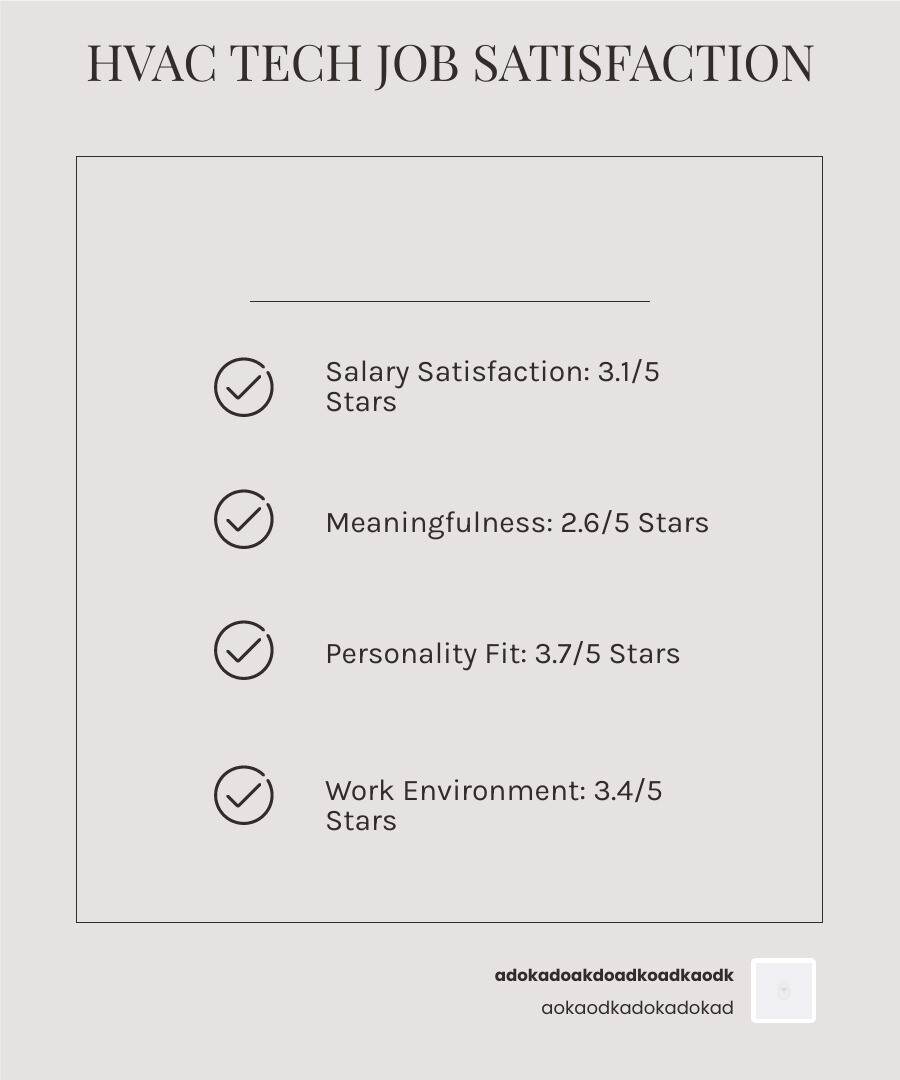Understanding an HVAC technician job satisfaction is a complex endeavor, revealing a spectrum of experiences from deep fulfillment to significant frustration. While the trade offers undeniable stability and demand, a closer look at the data suggests that overall happiness within the profession is not as high as one might expect. This disparity points to underlying factors that impact daily work life, from the nature of the tasks to the broader work environment.
Our research indicates that the HVAC field presents a mixed bag of ratings when it comes to career happiness. While many technicians find their day-to-day tasks engaging and well-suited to their personalities, challenges related to the perceived meaningfulness of their work and the physical demands of the job often weigh on their overall satisfaction. This section digs into the specific numbers that paint this picture, followed by an exploration of the key drivers behind these satisfaction levels.

Contents
The Numbers: A Mixed Bag of Ratings
According to recent surveys, HVAC technicians rate their career happiness 3.0 out of 5 stars, a score that places them in the bottom 29% of careers surveyed. This overall figure, while not overtly negative, suggests there’s considerable room for improvement and indicates that the profession, despite its essential nature, lags behind many others in terms of reported contentment.
Delving deeper into specific aspects of job satisfaction, we find varied responses:
- Salary satisfaction: HVAC technicians rated their satisfaction with their salaries 3.1 out of 5 stars. This indicates a generally neutral to slightly positive view on compensation, suggesting that while pay might not be a primary driver of dissatisfaction, it’s also not a standout source of high happiness.
- Meaningfulness rating: On average, HVAC technicians rate the meaningfulness of their work a low 2.6 out of 5. This is a critical insight, as a lack of perceived meaning can significantly impact long-term engagement and overall career fulfillment, even if other aspects of the job are satisfactory.
- Personality fit: Perhaps surprisingly, HVAC technicians rated their personality fit with their work an average of 3.7 out of 5. This high score suggests that the hands-on, problem-solving nature of the job aligns well with the inherent traits and interests of those who choose this career.
- Work environment enjoyment: HVAC technicians rated their enjoyment of their work environment 3.4 out of 5. This indicates a moderate level of contentment with their physical surroundings and daily conditions, which often involve varied locations and independent work.
These numbers reveal a paradox: technicians generally feel well-suited for the work and are reasonably content with their environment and pay, yet struggle to find deep meaning, which pulls down their overall happiness.
Key Drivers of Satisfaction and Dissatisfaction in HVAC
The factors influencing an HVAC technician’s job satisfaction are multifaceted, stemming from the intrinsic nature of the work, the industry’s demands, and the broader economic landscape.
Factors contributing most to satisfaction:
- Job Security & High Demand: The consistent need for climate control ensures steady work. The Bureau of Labor Statistics projects a 4% growth in HVAC technician jobs from 2019 to 2029, with some sources even projecting 9% growth by 2033, indicating robust job security and ample opportunities. This stability is a significant source of comfort and satisfaction.
- Hands-On & Varied Work: Technicians often express high satisfaction with the tangible, practical nature of their jobs. The work involves a constant variety of tasks—from diagnosing complex issues to installing new systems—and diverse environments, preventing monotony. This hands-on engagement and the visible results of their efforts provide a sense of accomplishment.
- Problem-Solving & Technical Challenge: HVAC work is inherently about troubleshooting and finding solutions. For individuals who enjoy logical puzzles and applying technical knowledge, this aspect of the job is highly rewarding. Each service call presents a unique challenge, requiring critical thinking and adaptability.
- Independence & Autonomy: Many HVAC technicians operate independently in the field, managing their schedules and making decisions on-site. This autonomy, combined with the freedom of being on the road rather than confined to an office, is a frequently cited positive aspect of the career.
- Direct Impact / Helping People: While the meaningfulness score is low overall, many technicians find satisfaction in directly helping people restore comfort, safety, and essential services, especially during extreme weather conditions. Being the “hero” who fixes a broken furnace in winter or an AC unit in summer can be very fulfilling.
Factors contributing most to dissatisfaction:
- Physical Demands & Hazards: The job is physically taxing, involving heavy lifting, working in confined spaces, at heights, and often in extreme temperatures (attics, crawl spaces, rooftops). Exposure to refrigerants, electrical components, and other hazardous materials also poses risks, leading to physical wear and tear over time.
- On-Call & Irregular Hours: The nature of HVAC emergencies means technicians are frequently on-call, working irregular hours, including nights, weekends, and holidays. This unpredictable schedule can significantly impact work-life balance and personal commitments.
- Seasonal Workload Extremes: The workload in HVAC is highly seasonal, with intense peaks during summer heatwaves and winter cold snaps, followed by slower periods. These fluctuations can lead to periods of extreme stress and long hours, followed by potential downtime, affecting income consistency and overall stability.
- Low Perceived Meaningfulness: As highlighted by the survey data, the struggle to find deep meaning in the work is a significant pain point. While technicians solve immediate problems, the broader impact or purpose of their daily tasks may not always feel profound, leading to a sense of detachment.
- Continuous Training & Adaptation: While an opportunity for growth, the constant need for ongoing training to keep pace with new technologies, energy efficiency standards, and regulatory changes can also be a source of stress and additional time commitment outside of billable hours.
Unpacking the Factors That Influence an HVAC Technician’s Career

Beyond the immediate day-to-day experiences, several foundational elements profoundly shape an HVAC technician’s career satisfaction. These include the financial compensation, the daily work environment, and the opportunities for professional growth and specialization. Understanding these factors is crucial for both aspiring technicians and current employers aiming to foster a more satisfied workforce.
The Financial Equation: Salary, Benefits, and Job Security
Compensation is a foundational component of job satisfaction. The median annual wage for HVAC technicians was approximately $50,590 in May 2020. More broadly, the average annual salary for HVAC mechanics and installers was $53,410 in 2020, with the national average around $48,730 per year. Notably, the highest 10% of technicians can earn over $77,920 annually, demonstrating significant earning potential with experience and specialization.
Projected job growth further solidifies the financial outlook. The Bureau of Labor Statistics projects a 4% growth in HVAC technician jobs from 2019 to 2029, with some more recent projections suggesting a 9% growth by 2033. This consistent demand ensures job security, a key factor in overall satisfaction.
Regional pay variations are significant, influenced by factors such as the local cost of living, demand for services, and state-specific licensing requirements. Technicians in high-cost-of-living areas or regions with extreme climates often command higher wages.
Beyond base salary, the impact of comprehensive benefits packages cannot be overstated. These often include health, dental, and vision insurance, retirement plans (like 401(k)s), paid time off, and allowances for tools or vehicles. Such benefits contribute significantly to a technician’s financial well-being and sense of security.
The essential nature of HVAC services means the job has a low risk of outsourcing, as work must be performed on-site. This inherent stability, coupled with the ongoing demand for skilled trades, provides a strong sense of job security that many other professions lack.
The Daily Grind: Work Environment and Work-Life Balance
The work environment for an HVAC technician is inherently dynamic, yet it comes with its own set of challenges that directly impact satisfaction.
- Physical demands: The job requires significant physical exertion, including lifting heavy equipment, climbing ladders, bending, kneeling, and working in tight or awkward spaces. This can lead to physical strain and long-term wear and tear on the body.
- Extreme temperatures: Technicians often work outdoors or in unconditioned spaces, exposing them to harsh weather conditions, whether it’s scorching summer heat or freezing winter cold.
- Confined spaces: Accessing HVAC units often means navigating crawl spaces, attics, or utility closets, which can be uncomfortable and claustrophobic.
- On-call stress: The necessity of providing emergency services means technicians are frequently on-call, leading to unpredictable schedules and disruptions to personal life. This can be a major source of stress and contribute to burnout.
- Overtime hours: During peak seasons, technicians often work long hours, including significant overtime, to meet customer demand. While this can boost earnings, it can also lead to fatigue and strain on personal relationships.
- Seasonal peaks and valleys: The workload fluctuates dramatically with the seasons. Intense periods of high demand are followed by slower periods, which can impact income consistency and create uncertainty.
- Residential vs. commercial environments: Technicians can work in residential, commercial, or industrial settings, each offering a different mix of challenges and environments. Commercial and industrial roles often involve larger, more complex systems but may offer more consistent, predictable work.
- Autonomy on the road: Despite the challenges, many technicians appreciate the independence of being on the road, managing their own schedules, and the freedom from a traditional office setting. This autonomy is often a significant source of job enjoyment.
Improving HVAC technician job satisfaction Through Career Growth
Opportunities for career advancement and continuous learning play a crucial role in preventing stagnation and fostering long-term satisfaction.
- Opportunities for advancement: The HVAC field offers clear pathways for career progression. Technicians can move into supervisory roles, become lead technicians, specialize in complex systems, or even transition into management, sales, or business ownership. Some experienced technicians also pursue engineering paths or become vocational instructors.
- Specialization: Focusing on niche areas can significantly boost earning potential and job satisfaction. Specializations include commercial refrigeration, air quality systems, energy efficiency solutions, building automation systems, or specific types of industrial HVAC equipment. This allows technicians to become experts and tackle more complex, high-value problems.
- Role of ongoing training: The HVAC industry is constantly evolving with new technologies, refrigerants, and energy efficiency standards. Ongoing training and skill development are essential. This includes mastering new diagnostic tools, understanding smart-home integrations, and adopting eco-friendly practices. Companies that invest in their technicians’ education demonstrate a commitment to their growth, which improves loyalty and satisfaction.
- EPA Section 608 certification: This certification for handling refrigerants is a fundamental requirement and a critical step in a technician’s professional development, ensuring compliance and expertise.
- Fostering meaningful work: To address the low meaningfulness scores, employers can emphasize the broader impact of a technician’s work—contributing to public health, safety, and economic productivity. Highlighting how their skills ensure comfortable homes, safe food storage, and operational hospitals can instill a greater sense of purpose. Empowering techs with better service offerings can boost pride and overall HVAC technician job satisfaction. Providing comprehensive protection plans, for instance, can streamline processes and improve customer trust, contributing to a more fulfilling work experience.
Actionable Insights for HVAC Business Owners

For HVAC business owners, understanding and actively addressing technician job satisfaction is not just about goodwill; it’s a strategic imperative. A satisfied workforce is more productive, provides better customer service, and is less likely to seek opportunities elsewhere, directly impacting the bottom line. Attracting and retaining top talent in a competitive market requires a multi-faceted approach that goes beyond just competitive pay.
Attracting and Retaining Top Talent in a Competitive Market
The demand for skilled HVAC technicians continues to outpace supply. To attract and keep the best, businesses must cultivate an environment that values their employees.
- Personality traits for success: While technical skills are paramount, certain personality traits are highly conducive to a satisfying and successful HVAC career. These include strong problem-solving skills, meticulous attention to detail, a hands-on approach, mechanical aptitude, excellent customer service abilities, and adaptability to new technologies and challenging situations. Businesses should seek candidates who demonstrate these qualities.
- Creating clear career paths: Technicians are more likely to stay with a company that offers a clear vision for their future. This involves outlining potential advancement opportunities, such as becoming a lead technician, a supervisor, or specializing in a high-demand area. Providing a roadmap for growth demonstrates investment in their long-term success.
- Offering competitive compensation: While not the sole factor, a competitive salary and comprehensive benefits package are essential. This includes not only base pay but also health insurance, retirement plans, paid time off, and performance-based bonuses or spiffs. Regular salary reviews to match market rates and cost of living are also crucial.
Beyond monetary compensation, businesses can offer a range of non-monetary benefits that significantly improve job satisfaction and retention:
- Professional Development & Training: Invest in ongoing education, including advanced technical courses, safety certifications, and customer service workshops. This not only improves skills but also shows a commitment to their professional growth.
- Mentorship Programs: Establish formal or informal mentorship programs that pair experienced technicians with newer hires. This fosters a sense of community, accelerates learning, and provides invaluable support.
- Recognition & Rewards: Implement programs to acknowledge and celebrate achievements. This can range from “Employee of the Month” awards and public acknowledgments to performance bonuses, gift cards, or even company-wide celebrations of milestones. Regular, specific feedback is also a powerful form of recognition.
- Flexible Scheduling: Where feasible, offer flexible scheduling options, especially during shoulder seasons, to support work-life balance. This might include compressed workweeks or more predictable on-call rotations.
- Modern Tools & Technology: Equip technicians with the latest diagnostic tools, efficient equipment, and user-friendly software. This reduces physical strain, improves efficiency, and signals that the company values their time and well-being.
Fostering a Culture That Boosts HVAC technician job satisfaction
A positive workplace culture is built on trust, respect, and support. For HVAC businesses, this means actively promoting an environment where technicians feel valued and heard.
- Promoting work-life balance: Actively encourage technicians to take their vacation and personal days. Implement fair and equitable on-call rotations to minimize burnout. Acknowledge that employees have lives outside of work and support their ability to maintain personal commitments.
- Investing in modern tools and technology: Providing up-to-date, reliable equipment not only makes the job easier and safer but also signals to technicians that the company is committed to their success and well-being. This can include advanced diagnostic equipment, ergonomic tools, and efficient vehicle fleets.
- Recognizing achievements: Beyond formal programs, foster a culture of regular appreciation. Simple gestures like a public shout-out for a job well done, a thank-you note, or celebrating team successes can significantly boost morale.
- Implementing mentorship programs: These programs not only transfer knowledge but also build strong internal networks and a sense of belonging, which is crucial for job satisfaction.
- Soliciting employee feedback: Create channels for open communication where technicians feel comfortable sharing their ideas, concerns, and suggestions. Regularly conduct anonymous surveys to gauge satisfaction levels and identify areas for improvement. Act on this feedback to show that their opinions matter.
- Creating a safe and supportive work environment: Prioritize safety protocols and provide all necessary personal protective equipment. Foster a supportive team dynamic where technicians feel comfortable asking for help and collaborating on challenging jobs. A culture of psychological safety where mistakes are learning opportunities, not causes for blame, is vital.
By systematically addressing these factors, HVAC business owners can not only attract and retain top talent but also cultivate a workforce that is genuinely happy, engaged, and proud of the essential service they provide to communities every day.


